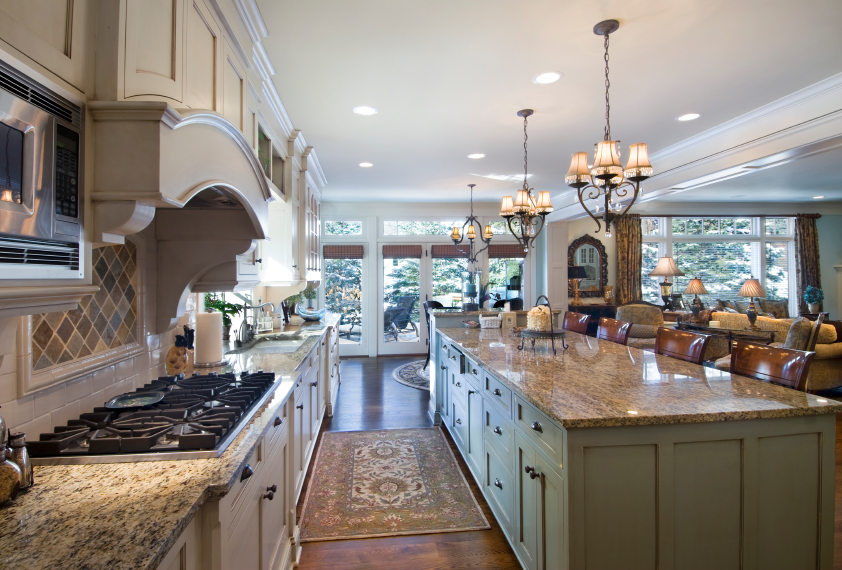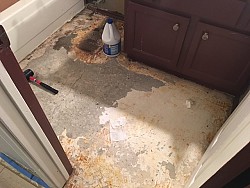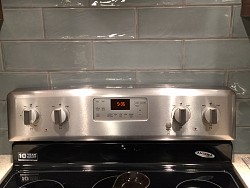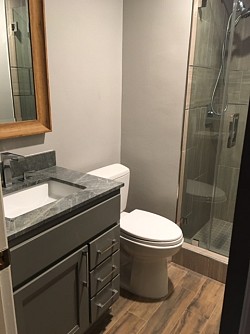Quartz Surfaces
 Quartz countertops have been on the market only since the '90's, but they certainly have made quite a splash on the home front. Quartz is one of the most plentiful materials on the planet and can be found virtually everywhere. Engineered quartz surfacing is made up of approximately 93-95% natural quartz mixed with crushed quartz, silica sand and a thermoplastic polyester resin. The mash is then made into slabs which can be cut into any size or shape required.
Quartz countertops have been on the market only since the '90's, but they certainly have made quite a splash on the home front. Quartz is one of the most plentiful materials on the planet and can be found virtually everywhere. Engineered quartz surfacing is made up of approximately 93-95% natural quartz mixed with crushed quartz, silica sand and a thermoplastic polyester resin. The mash is then made into slabs which can be cut into any size or shape required.
Quartz makes for a great countertop material because it's one of the most durable materials on Earth. Only three other minerals are harder: sapphires, topaz and diamonds, which are best saved for jewelry than kneading dough! Granite countertops simply cannot compare to quartz when it comes to durability. The non-porous surface is nearly stain proof, sanitary and never needs sealing, unlike granite, soapstone or marble. Like most other surfaces, quartz can scorch, so trivets should be used, but otherwise, it's a pretty indestructible surface material.
As a design element, quartz offers a wide variety of opportunities. It can be pigmented in any color and can be textured and finished to resemble other materials such as marble, soapstone or cement. Engineered quartz can be cut and edged like a natural stone, yet can be custom colored to match any design scheme. Quartz can also be used wherever granite or other stone surfaces can. In addition to countertops, it makes for a great backsplash, tabletop or mantle because it has excellent vertical strength as well as horizontal. This means that quartz surfaces will work as well in the bath as it does in the kitchen. Quartz is an excellent choice for showers and bathtub surrounds and its natural anti-microbial properties are an excellent feature for these uses. The downside to engineered quartz is that it has a very smooth, consistent pattern and does not contain the exuberant graining and patterns or natural stones. For those who love pattern and motion in their stones, quartz is not likely the best choice. But, many are looking for a more subtle patterning and this is an excellent choice on that score.
A quartz countertop is extremely heavy - heavier than other natural stones - and is not recommended as a DIY project. As a matter of fact, this is a requirement of some of the well-known manufacturers of the product, such as Silestone and Caesarston. This also means that special consideration need be given to the supporting structures-the cabinets, floor or walls. If you plan on installing quartz or any similar slab of stone on a large scale-such as a center island - it's vitally important that you assess the structural needs of your home. If necessary, hire a structural engineer to make sure that the weight can be supported.
On the pricing front, while prices have come down as popularity increases, engineered quartz countertops are priced similarly to granite. So, as with those other natural material countertops, how this fits into the overall budget is a major consideration. Remember, "engineered" does not indicate "fake" or "just like" any other product. Quartz is its own material and what it brings to the table is incredible strength and durability, design flexibility, and excellent sustainability.
Looking for a Pro? Call us (866) 441-6648

Average Costs
Related Experiences

From Hot Mess To Very Cool Tiled Bathroom Floors

Backsplash Tiled So Well That I’m Hiring The Contractor Again



